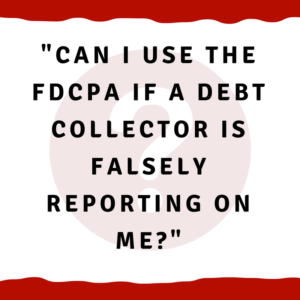Can I use the FDCPA if a debt collector is falsely reporting on me?
“Can I use the FDCPA if a debt collector is falsely reporting on me?”
 You may be dealing with a debt collector who puts false information on your credit report, and one question that you may have is, “Can I use the FDCPA to stop this?”
You may be dealing with a debt collector who puts false information on your credit report, and one question that you may have is, “Can I use the FDCPA to stop this?”
The answer is yes, you can use the FDCPA.
You can definitely use this law (Fair Debt Collection Practices Act) to help you.
When a debt collector is falsely reporting on you, there are generally two ways to handle it.
1.) You can dispute it under the FCRA (Fair Credit Reporting Act).
This is where you send a dispute letter to Equifax, Experian, and Transunion.
In that letter, you ask them to fix the errors on your credit report.
You can also send this letter to the debt collector.
2.) You can sue the debt collector directly.
If it’s clearly false information, we usually skip sending them a letter, particularly if you’ve dealt with the same collector before.
This is where you use the FDCPA.
The FDCPA prohibits false credit reporting.
Here are a few examples of false credit reporting.
Let’s say that you owe $5,000, and the debt collector says, “How about we make a deal. You pay us $3,000, and then we will consider your debt paid.”
You take that deal, and pay them $3,000.
However, 60 days later, the debt collector still reports on your credit and says that you still owe $3,000.
This is false credit reporting, because they said that you could settle for $3,000, but they’re still showing that you owe $2,000 when you owe them nothing.
Every situation is different, but generally if they do something like this, you can sue the collector directly instead of going through the credit bureau.
Another example is the collector suing you for $2,000, you winning your case, and they still keep that debt on your credit report.
First of all, they never should have reported that debt.
If they’re reporting that you owe them $2,000 before they sue you, that violates the law.
When you go forward in time to you winning your case, which is where the judge rules that you don’t owe it, it violates the law for them to continue falsely reporting on you.
Sometimes we go through the credit bureau, sometimes we go on and sue the collector directly.
Contact us.
If you live in Alabama and have any questions about what you should do if you’re in any of the situations mentioned in this article, feel free to get in touch with us.
We will be more than happy to help walk you through your options, and help you figure out what the best option is for you.
You can reach us by phone at 1-205-879-2447 and ask for Carolyn, or you can fill out a contact form and we will gladly get in touch with you.
I look forward to talking with you soon.
Have a great day!